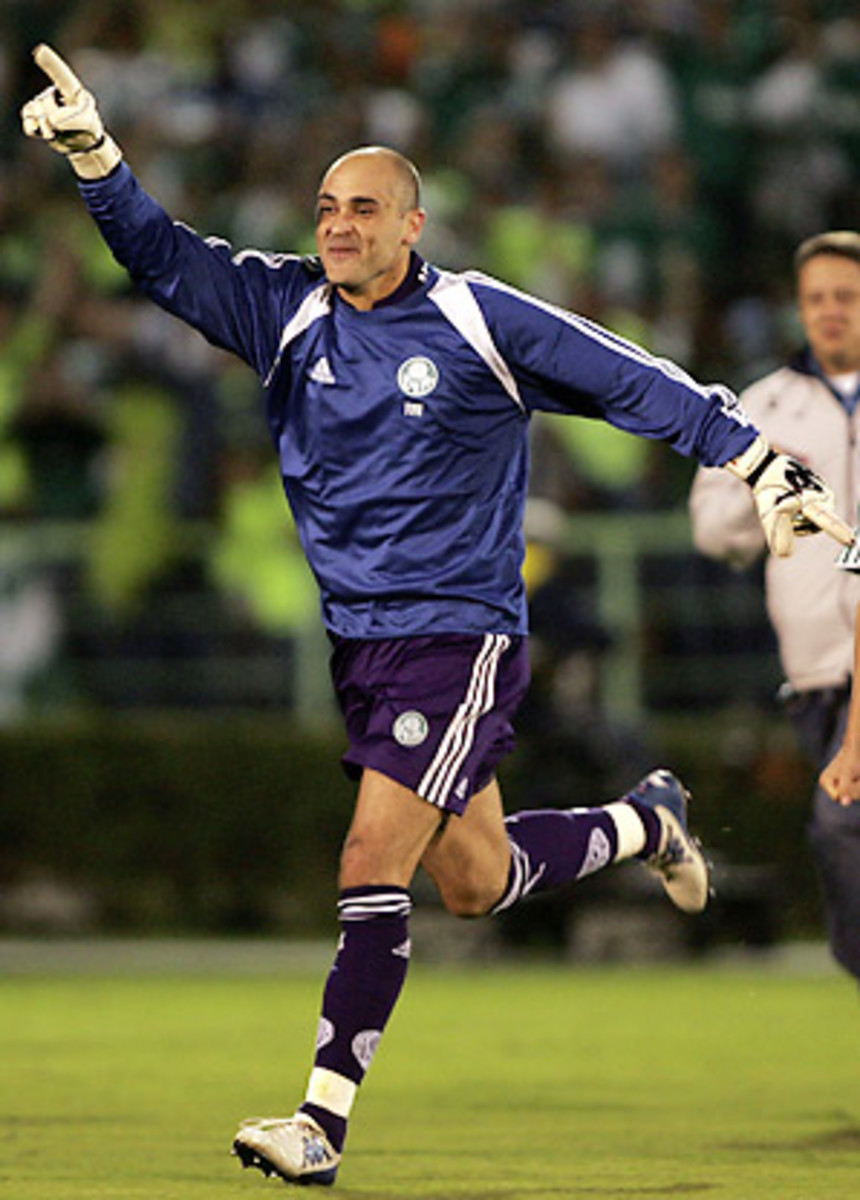Marcos, hero who never left home


Lionel Messi and maybe Sylvinho on one side, Anderson and perhaps CarlosTévez on the other -- there's plenty of South American interest when Barcelona meets Manchester United on Wednesday in the final of Europe's Champions League.
All over the continent, South American players will be watching the action in Rome and dreaming they were there on the field. Very, very few can say they could have been there but turned the chance down. Marcos is one of them.
Brazil's 2002 World Cup-winning goalkeeper could be there, in the very elite of European club football. The offer was on the table. Arsenal wanted him some six years ago -- perhaps with him in goal rather than Lukasz Fabianski and the London club might have had more of a chance of overcoming Manchester United in the semifinals.
Few would doubt that Marcos is more than capable of shining in Europe -- but he opted to stay at home. A rustic soul, he simply couldn't imagine himself living in London, Manchester, Barcelona or anywhere else. Foreign life, foreign food, organizing his defense in a second language -- it wasn't for him. So he stayed with Palmeiras, the São Paulo club where he now has spent almost half his life.
Marcos' longevity with Palmeiras often has been overshadowed by that of Rogério Ceni of local rival São Paulo FC. The pair have spent almost the same length of time with their respective clubs. Rogério, though, has the eye-catching advantage of his magnificent free kicks. He has scored more goals than any other goalkeeper in the history of the game.
But in some ways, the achievement of Marcos as a one-club legend is even more impressive than that of RogérioCeni. First, purely as a goalkeeper, a case could be made for Marcos being the better of the two. Luiz Felipe Scolari certainly thought so. Marcos was his first-choice keeper in the '02 World Cup, with Rogério as the No. 3.
And Marcos fully lived up to his billing in Japan and South Korea. He had a superb tournament. Without him, Brazil could well have been beaten in its second-round game against Belgium. And though Ronaldo understandably grabbed the headlines after the final against Germany, the keeper came up big once more. He made two vital saves when the game was still scoreless, pushing Oliver Neuville's free kick onto a post, and diving left to block a dangerous ball in from Bernd Schneider. And with Brazil two goals ahead, he nipped a comeback in the bud when he blocked an Oliver Bierhoff shot.
Tall, athletic, commanding, good under pressure -- Marcos' displays in '02 gave him more market in Europe than Rogério, who hasn't always seemed so impressive in European eyes. And then there's the fact that Rogério is at Brazil's best-structured club. If a player is going to spend nearly two decades with one Brazilian outfit, São Paulo would be the institution most would choose. Organized and pragmatic, São Paulo is an oasis of stability.
Palmeiras, on the other hand, often has found itself stuck in the sandstorms. At the end of '02, it was even relegated to the second division. Marcos, World Cup winner's medal and all, stayed with the club and hauled it back up at the end of the following year. Not only did he choose Brazil over Europe, he went with Brazil's second division rather than Europe's elite.
Little wonder, then, that he's a club legend. Palmeiras has rewarded his loyalty with a new five-year contract. He's unlikely to keep playing for all that time (he'll be 36 in August), but the idea is that he'll play for as long as he wants, say two more years, and then spend the rest of the time finding his feet as part of the club's coaching staff.
For the moment, though, Marcos' thoughts won't be wandering much further than this week's big game. Not Barcelona against Man. United, but Palmeiras' home tie against Nacional of Uruguay in the first leg of the quarterfinals of the Copa Libertadores.
The competition has a special place in Marcos' heart. His breakthrough year was 1999, when he established himself in the first team as Palmeiras won the trophy for the first time. He was voted man of the match as "Big Green" overcame Colombia's Deportivo Cali on penalties in the final, and it was there that he first picked up the nickname of "Saint Marcos."
The miracle-worker is back. Back in '99, Marcos wore the No. 12 shirt. He has chosen it again this year, both in remembrance of his feats of a decade ago, and also in a superstitious attempt to ward off the injuries he has suffered in recent years while her wore No. 1.
The magic seems to be working. Palmeiras is only in the quarterfinals because Marcos produced an exceptional performance in the previous round. The team was holding a 1-0 lead against fellow Brazilians Sport of Recife, a notoriously difficult venue for visitors. Marcos needed to be at his best to ensure that his side only lost by a single goal -- and then he excelled in the penalty shootout. Twice he plunged left, once he plunged right, blocking three of Sport's four spot kicks and ensuring a place in the last eight for Palmeiras.
It was the performance of a man on a mission, a player whose refusal to go to Europe should not be interpreted as a lack of ambition. Saint Marcos is still chasing miracles, but wants to perform them on this side of the Atlantic.
